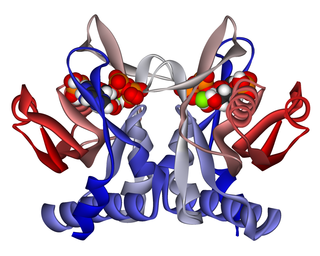Diferencia entre revisiones de «Adenina fosforribosiltransferasa»
Apariencia
Contenido eliminado Contenido añadido
Nuevo artículo |
(Sin diferencias)
|
Revisión del 01:20 8 dic 2008
| Adenina fosforribosiltransferasa | ||||
|---|---|---|---|---|
 | ||||
| Estructuras disponibles | ||||
| PDB | ||||
| Identificadores | ||||
| Identificadores externos |
Bases de datos de enzimas
| |||
| Número EC | 2.4.2.7 | |||
| Locus | Cr. 16 q24.3 | |||
| Ortólogos | ||||
| Especies |
| |||
| Entrez |
| |||
| UniProt |
| |||
| RefSeq (ARNm) |
| |||
| PubMed (Búsqueda) |
| |||
| PMC (Búsqueda) |
| |||
La adenina fosforribosiltransferasa, también conocida como APRT, es una enzima codificada en el cromosoma 16 humano,[1] involucrada en la biosíntesis de purinas mediante la ruta de rescate de nucleótidos. Su función es catalizar la reacción entre la adenina y el fosforribosil pirofosfato (PRPP) para formar AMP. La APRT posee el EC 2.4.2.7.
La APRT se encuentra funcionalmente relacionada con la hipoxantina-guanina fosforribosiltransferasa (HPRT).
Patología
La deficiencia de APRT en el ser humano puede producir cálculos renales, formados a partir de adenina y sales, dando lugar a una patología denominada 2,8 dihidroxi-adenina urolitiasis.
Referencias
Información adicional
- Tischfield JA, Engle SJ, Gupta PK, et al. (1995). «Germline and somatic mutation at the APRT locus of mice and man.». Adv. Exp. Med. Biol. 370: 661-4. PMID 7660991.
- Takeuchi H, Kaneko Y, Fujita J, Yoshida O (1993). «A case of a compound heterozygote for adenine phosphoribosyltransferase deficiency (APRT*J/APRT*Q0) leading to 2,8-dihydroxyadenine urolithiasis: review of the reported cases with 2,8-dihydroxyadenine stones in Japan.». J. Urol. 149 (4): 824-6. PMID 8455250.
- Ludwig H, Kuzmits R, Pietschmann H, Müller MM (1980). «Enzymes of the purine interconversion system in chronic lymphatic leukemia: decreased purine nucleoside phosphorylase and adenosine deaminase activity.». Blut 39 (5): 309-15. PMID 116697.
- Johnson LA, Gordon RB, Emmerson BT (1977). «Adenine phosphoribosyltransferase: a simple spectrophotometric assay and the incidence of mutation in the normal population.». Biochem. Genet. 15 (3-4): 265-72. PMID 869896.
- Kamatani N, Hakoda M, Otsuka S, et al. (1992). «Only three mutations account for almost all defective alleles causing adenine phosphoribosyltransferase deficiency in Japanese patients.». J. Clin. Invest. 90 (1): 130-5. PMID 1353080.
- Chen J, Sahota A, Laxdal T, et al. (1992). «Identification of a single missense mutation in the adenine phosphoribosyltransferase (APRT) gene from five Icelandic patients and a British patient.». Am. J. Hum. Genet. 49 (6): 1306-11. PMID 1746557.
- Mimori A, Hidaka Y, Wu VC, et al. (1991). «A mutant allele common to the type I adenine phosphoribosyltransferase deficiency in Japanese subjects.». Am. J. Hum. Genet. 48 (1): 103-7. PMID 1985452.
- Chen J, Sahota A, Stambrook PJ, Tischfield JA (1991). «Polymerase chain reaction amplification and sequence analysis of human mutant adenine phosphoribosyltransferase genes: the nature and frequency of errors caused by Taq DNA polymerase.». Mutat. Res. 249 (1): 169-76. PMID 2067530.
- Gathof BS, Sahota A, Gresser U, et al. (1992). «Identification of a splice mutation at the adenine phosphoribosyltransferase locus in a German family.». Klin. Wochenschr. 69 (24): 1152-5. PMID 2135300.
- Kamatani N, Kuroshima S, Hakoda M, et al. (1990). «Crossovers within a short DNA sequence indicate a long evolutionary history of the APRT*J mutation.». Hum. Genet. 85 (6): 600-4. PMID 2227951.
- Kamatani N, Kuroshima S, Terai C, et al. (1989). «Detection of an amino acid substitution in the mutant enzyme for a special type of adenine phosphoribosyltransferase (APRT) deficiency by sequence-specific protein cleavage.». Am. J. Hum. Genet. 45 (2): 325-31. PMID 2502918.
- Hidaka Y, Tarlé SA, Fujimori S, et al. (1988). «Human adenine phosphoribosyltransferase deficiency. Demonstration of a single mutant allele common to the Japanese.». J. Clin. Invest. 81 (3): 945-50. PMID 3343350.
- Wilson JM, O'Toole TE, Argos P, et al. (1986). «Human adenine phosphoribosyltransferase. Complete amino acid sequence of the erythrocyte enzyme.». J. Biol. Chem. 261 (29): 13677-83. PMID 3531209.
- Broderick TP, Schaff DA, Bertino AM, et al. (1987). «Comparative anatomy of the human APRT gene and enzyme: nucleotide sequence divergence and conservation of a nonrandom CpG dinucleotide arrangement.». Proc. Natl. Acad. Sci. U.S.A. 84 (10): 3349-53. PMID 3554238.
- Hidaka Y, Palella TD, O'Toole TE, et al. (1987). «Human adenine phosphoribosyltransferase. Identification of allelic mutations at the nucleotide level as a cause of complete deficiency of the enzyme.». J. Clin. Invest. 80 (5): 1409-15. PMID 3680503.
- Hidaka Y, Tarlé SA, O'Toole TE, et al. (1988). «Nucleotide sequence of the human APRT gene.». Nucleic Acids Res. 15 (21): 9086. PMID 3684585.
- Chen J, Sahota A, Martin GF, et al. (1993). «Analysis of germline and in vivo somatic mutations in the human adenine phosphoribosyltransferase gene: mutational hot spots at the intron 4 splice donor site and at codon 87.». Mutat. Res. 287 (2): 217-25. PMID 7685481.
- Sahota A, Chen J, Boyadjiev SA, et al. (1994). «Missense mutation in the adenine phosphoribosyltransferase gene causing 2,8-dihydroxyadenine urolithiasis.». Hum. Mol. Genet. 3 (5): 817-8. PMID 7915931.
